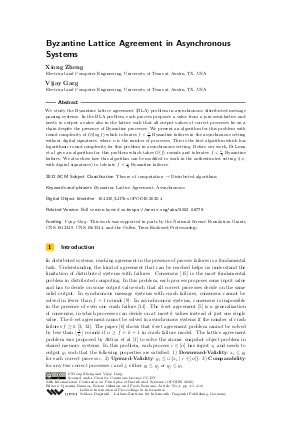Byzantine Lattice Agreement in Asynchronous Systems
Authors Xiong Zheng, Vijay Garg
-
Part of:
Volume:
24th International Conference on Principles of Distributed Systems (OPODIS 2020)
Part of: Series: Leibniz International Proceedings in Informatics (LIPIcs)
Part of: Conference: International Conference on Principles of Distributed Systems (OPODIS) - License:
 Creative Commons Attribution 3.0 Unported license
Creative Commons Attribution 3.0 Unported license
- Publication Date: 2021-01-25
File

PDF
LIPIcs.OPODIS.2020.4.pdf
- Filesize: 0.5 MB
- 16 pages
Document Identifiers
Related Versions
-
Full version hosted on https://arxiv.org/abs/2002.06779.
Subject Classification
ACM Subject Classification
- Theory of computation → Distributed algorithms
Keywords
- Byzantine Lattice Agreement
- Asynchronous
Metrics
- Access Statistics
-
Total Accesses (updated on a weekly basis)
0Document
0Metadata
Abstract
We study the Byzantine lattice agreement (BLA) problem in asynchronous distributed message passing systems. In the BLA problem, each process proposes a value from a join semi-lattice and needs to output a value also in the lattice such that all output values of correct processes lie on a chain despite the presence of Byzantine processes. We present an algorithm for this problem with round complexity of O(log f) which tolerates f < n/5 Byzantine failures in the asynchronous setting without digital signatures, where n is the number of processes. This is the first algorithm which has logarithmic round complexity for this problem in asynchronous setting. Before our work, Di Luna et al give an algorithm for this problem which takes O(f) rounds and tolerates f < n/3 Byzantine failures. We also show how this algorithm can be modified to work in the authenticated setting (i.e., with digital signatures) to tolerate f < n/3 Byzantine failures.
Cite As Get BibTex
Xiong Zheng and Vijay Garg. Byzantine Lattice Agreement in Asynchronous Systems. In 24th International Conference on Principles of Distributed Systems (OPODIS 2020). Leibniz International Proceedings in Informatics (LIPIcs), Volume 184, pp. 4:1-4:16, Schloss Dagstuhl – Leibniz-Zentrum für Informatik (2021)
https://doi.org/10.4230/LIPIcs.OPODIS.2020.4
BibTex
@InProceedings{zheng_et_al:LIPIcs.OPODIS.2020.4,
author = {Zheng, Xiong and Garg, Vijay},
title = {{Byzantine Lattice Agreement in Asynchronous Systems}},
booktitle = {24th International Conference on Principles of Distributed Systems (OPODIS 2020)},
pages = {4:1--4:16},
series = {Leibniz International Proceedings in Informatics (LIPIcs)},
ISBN = {978-3-95977-176-4},
ISSN = {1868-8969},
year = {2021},
volume = {184},
editor = {Bramas, Quentin and Oshman, Rotem and Romano, Paolo},
publisher = {Schloss Dagstuhl -- Leibniz-Zentrum f{\"u}r Informatik},
address = {Dagstuhl, Germany},
URL = {https://drops.dagstuhl.de/entities/document/10.4230/LIPIcs.OPODIS.2020.4},
URN = {urn:nbn:de:0030-drops-134894},
doi = {10.4230/LIPIcs.OPODIS.2020.4},
annote = {Keywords: Byzantine Lattice Agreement, Asynchronous}
}
Author Details
Funding
- Garg, Vijay: This work was supported in parts by the National Science Foundation Grants CNS-1812349, CNS-1563544, and the Cullen Trust Endowed Professorship.
References
-
Hagit Attiya, Maurice Herlihy, and Ophir Rachman. Atomic snapshots using lattice agreement. Distributed Computing, 8(3):121-132, 1995.

-
Hagit Attiya and Ophir Rachman. Atomic snapshots in o (n log n) operations. SIAM Journal on Computing, 27(2):319-340, 1998.

-
Martin Biely, Zarko Milosevic, Nuno Santos, and Andre Schiper. S-paxos: Offloading the leader for high throughput state machine replication. In 2012 IEEE 31st Symposium on Reliable Distributed Systems, pages 111-120. IEEE, 2012.

-
Gabriel Bracha. Asynchronous Byzantine agreement protocols. Information and Computation, 75(2):130-143, 1987.

-
Soma Chaudhuri. More choices allow more faults: Set consensus problems in totally asynchronous systems. Inf. Comput., 105(1):132-158, 1993.

-
Soma Chaudhuri, Maurice Herlihy, Nancy A Lynch, and Mark R Tuttle. Tight bounds for k-set agreement. Journal of the ACM (JACM), 47(5):912-943, 2000.

-
Giuseppe Antonio Di Luna, Emmanuelle Anceaume, Silvia Bonomi, and Leonardo Querzoni. Synchronous byzantine lattice agreement in 𝒪(log f) rounds. arXiv preprint arXiv:2001.02670, 2020.

-
Giuseppe Antonio Di Luna, Emmanuelle Anceaume, and Leonardo Querzoni. Byzantine generalized lattice agreement. arXiv preprint arXiv:1910.05768, 2019.

-
Danny Dolev and H Raymond Strong. Authenticated algorithms for Byzantine agreement. SIAM Journal on Computing, 12(4):656-666, 1983.

-
Jose M Faleiro, Sriram Rajamani, Kaushik Rajan, G Ramalingam, and Kapil Vaswani. Generalized lattice agreement. In Proceedings of the 2012 ACM symposium on Principles of distributed computing, pages 125-134. ACM, 2012.

-
Michael J Fischer, Nancy A Lynch, and Michael S Paterson. Impossibility of distributed consensus with one faulty process. Journal of the ACM (JACM), 32(2):374-382, 1985.

-
Maurice Herlihy, Sergio Rajsbaum, and Mark R Tuttle. Unifying synchronous and asynchronous message-passing models. In Proceedings of the seventeenth annual ACM symposium on Principles of distributed computing, pages 133-142, 1998.

-
Marios Mavronicolasa. A bound on the rounds to reach lattice agreement. http://www.cs.ucy.ac.cy/ mavronic/pdf/lattice.pdf, 2018.

-
Thomas Nowak and Joel Rybicki. Byzantine approximate agreement on graphs. In 33rd International Symposium on Distributed Computing (DISC 2019). Schloss Dagstuhl-Leibniz-Zentrum fuer Informatik, 2019.

-
Marshall Pease, Robert Shostak, and Leslie Lamport. Reaching agreement in the presence of faults. Journal of the ACM (JACM), 27(2):228-234, 1980.

-
Marc Shapiro, Nuno Preguiça, Carlos Baquero, and Marek Zawirski. Conflict-free replicated data types. In Symposium on Self-Stabilizing Systems, pages 386-400. Springer, 2011.

-
Jan Skrzypczak, Florian Schintke, and Thorsten Schütt. Linearizable state machine replication of state-based crdts without logs. arXiv preprint arXiv:1905.08733, 2019.

-
Xiong Zheng and Vijay K Garg. Byzantine lattice agreement in synchronous systems. In 34nd International Symposium on Distributed Computing (DISC 2020), 2020.

-
Xiong Zheng, Vijay K. Garg, and John Kaippallimalil. Linearizable Replicated State Machines With Lattice Agreement. In Pascal Felber, Roy Friedman, Seth Gilbert, and Avery Miller, editors, 23rd International Conference on Principles of Distributed Systems (OPODIS 2019), volume 153 of Leibniz International Proceedings in Informatics (LIPIcs), pages 29:1-29:16, Dagstuhl, Germany, 2020. Schloss Dagstuhl-Leibniz-Zentrum fuer Informatik.

-
Xiong Zheng, Changyong Hu, and Vijay K Garg. Lattice agreement in message passing systems. In 32nd International Symposium on Distributed Computing (DISC 2018). Schloss Dagstuhl-Leibniz-Zentrum fuer Informatik, 2018.

